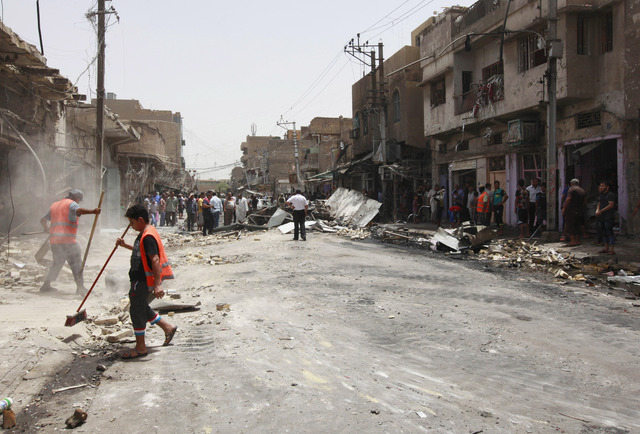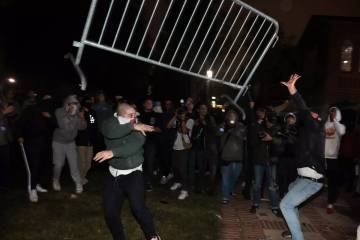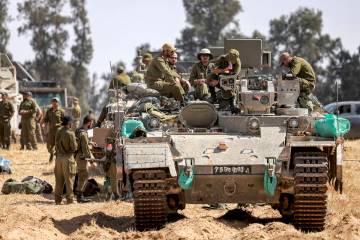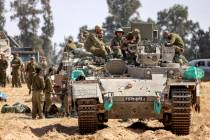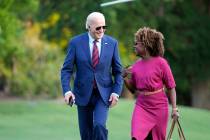Most Americans ready to close the books on wars in Iraq and Afghanistan
WASHINGTON — Three in four Americans think history will judge the wars in Iraq and Afghanistan as failures, according to an Associated Press-GfK poll that shows that about the same percentage think it was right to pull forces from the two countries.
Americans surveyed in last month’s poll were not optimistic about the chance that a stable democratic government will be established in either country. Seventy-eight percent said it was either not too likely or not at all likely in Afghanistan and 80 percent said the same about Iraq.
Roughly three out of four Americans polled think that in hindsight, each war will be deemed as an outright “complete failure” or “more of a failure than success.”
A majority of those polled, or 70 percent, said the United States was right to withdraw American troops from Iraq in 2011 and pull most U.S. forces out of Afghanistan by December. The two conflicts have consumed the nation for more than a decade and claimed the lives of 6,800 U.S. troops.
Nelson Philip, 73, of Oswego, Illinois, is of two minds. He judges the Afghan war a failure, but wants U.S. troops to stay in countries that remain in turmoil.
“What’s so successful about it? We didn’t do anything there. The Taliban. They’re still there. We haven’t done anything and now we’re pulling everybody out of there,” Philip said. “And now this Islamic group is over there taking over Iraq.”
The situations in Afghanistan and Iraq are distinct. But in each, the U.S. has spent more than a decade trying to set up democratic governments that could effectively police their own territories and stamp out threats to the American homeland. And in both countries that objective is in peril — their futures threatened by a combination of poor leadership, weak institutions, interethnic rivalry, insurgencies and extremist rebellions.
Americans surveyed in the poll think more bad news is on the horizon.
Fifty percent — up 18 points in the past seven months — think the situation in Afghanistan will get worse. Fifty-eight percent — up from 16 percent in December 2009 — expect conditions in Iraq will worsen. The poll was conducted shortly after Sunni extremists conducted an offensive that shattered security in Iraq.
The rapid advance by the extremist Islamic State group, which captured Iraq’s second-largest city, Mosul, and overran much of northern and western Iraq, has plunged the country into its worst crisis since the withdrawal of U.S. troops at the end of 2011.
Melody Fisher, a 58-year-old midwife from Prescott, Ariz., was among the roughly 25 percent who didn’t think it was time yet for American troops to return from Afghanistan, where about 2,340 U.S. servicemen and women have been killed. She said she wasn’t convinced that the U.S. had finished its work there.
“I used to work with refuges so I’m very aware of the conditions that people have to live in,” said Fisher, a midwife who spent time helping resettle Cambodian refugees. “Our country, our nation, has no idea about the day-to-day things that people have to go through in many places.”
People over 50 expressed far more pessimism about the ultimate outcome of the two conflicts than their younger counterparts.
Sixty-two percent of those over 50 said the situation in Afghanistan would get worse in the coming year, compared with 40 percent of younger Americans. On Iraq, that gap is even larger, with 72 percent age 50 or older expecting things to get worse compared with 47 percent of those under age 50.
Older Americans also are more likely to think the U.S. war in Afghanistan will be judged a failure in the future; 86 percent of those 50 or older feel that way, compared with 64 percent among those under age 50. They are also more likely to doubt that a stable democratic government will be established there; 88 percent age 50 or older say it’s unlikely to happen compared with 70 percent age 18 to 49.
The AP-GfK Poll was conducted July 24-28, 2014 using KnowledgePanel, GfK’s probability-based online panel designed to be representative of the U.S. population. It involved online interviews with 1,044 adults, and has a margin of sampling error of plus or minus 3.4 percentage points for all respondents. It is larger for subgroups.
Respondents were first selected randomly using phone or mail survey methods, and were later interviewed online. People selected for KnowledgePanel who didn’t otherwise have access to the Internet were provided with the ability to access the Internet at no cost to them.



